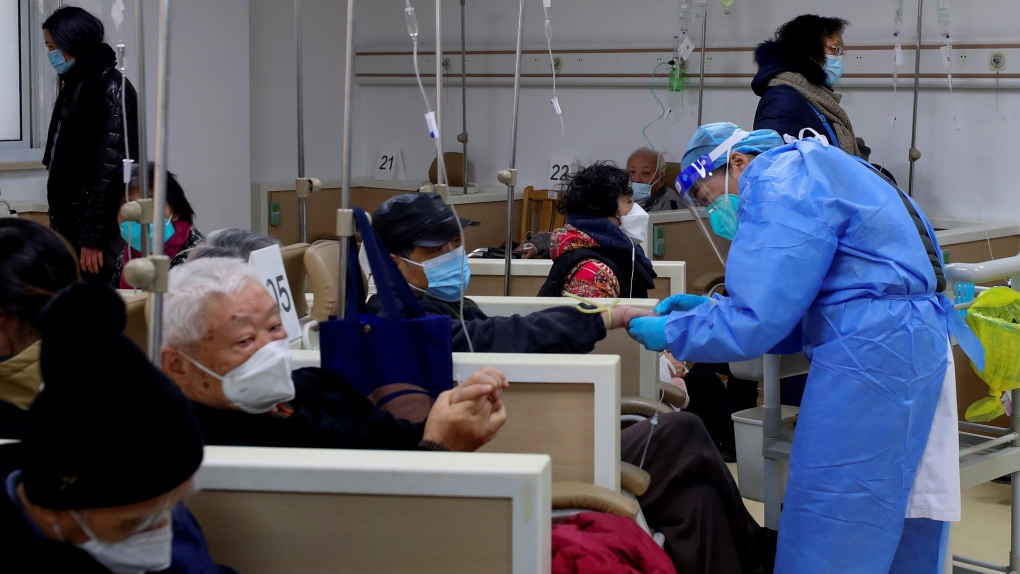Media
China suspends social media accounts of COVID-19 policy critics
|
|


BEIJING –
China has suspended or closed the social media accounts of more than 1,000 critics of the government’s policies on the COVID-19 outbreak, as the country moves to further open up.
The popular Sina Weibo social media platform said it had addressed 12,854 violations including attacks on experts, scholars and medical workers and issued temporary or permanent bans on 1,120 accounts.
The ruling Communist Party had largely relied on the medical community to justify its harsh lockdowns, quarantine measures and mass testing, almost all of which it abruptly abandoned last month, leading to a surge in new cases that have stretched medical resources to their limits. The party allows no direct criticism and imposes strict limits on free speech.
The company “will continue to increase the investigation and cleanup of all kinds of illegal content, and create a harmonious and friendly community environment for the majority of users,” Sina Weibo said in a statement dated Thursday.
Criticism has largely focused on open-ended travel restrictions that saw people confined to their homes for weeks, sometimes without adequate food or medical care. Anger was also vented over the requirement that anyone who potentially tested positive or had been in contact with such a person be confined for observation in a field hospital, where overcrowding, poor food and hygiene were commonly cited.
The social and economic costs eventually prompted rare street protests in Beijing and other cities, possibly influencing the party’s decision to swiftly ease the strictest measures.
China is now facing a surge in cases and hospitalizations in major cities and is bracing for a further spread into less developed areas with the start of the Lunar New Year travel rush, set to get underway in coming days. While international flights are still reduced, authorities say they expect domestic rail and air journeys will double over the same period last year, bringing overall numbers close to those of the 2019 holiday period before the pandemic hit.
The Transportation Ministry on Friday called on travelers to reduce trips and gatherings, particularly if they involve elderly people, pregnant women, small children and those with underlying conditions.
People using public transport are also urged to wear masks and pay special attention to their health and personal hygiene, Vice Minister Xu Chengguang told reporters at a briefing.
Nonetheless, China is forging ahead with a plan to end mandatory quarantines for people arriving from abroad beginning on Sunday.
Beijing also plans to drop a requirement for students at city schools to have a negative COVID-19 test to enter campus when classes resume Feb. 13 after the holiday break. While schools will be allowed to move classes online in the event of new outbreaks, they must return to in-person instruction as soon as possible, the city education bureau said in a statement Friday.
However, the end to mass testing, a lack of basic data such as the number of deaths, infections and severe cases, and the potential emergence of new variants have prompted governments elsewhere to institute virus testing requirements for travelers from China.
The World Health Organization has also expressed concern about the lack of data from China, while the U.S. is requiring a negative test result for travelers from China within 48 hours of departure.
Chinese health authorities publish a daily count of new cases, severe cases and deaths, but those numbers include only officially confirmed cases and use a very narrow definition of COVID-related deaths.
China has said the testing requirements aren’t science-based and has threatened unspecified countermeasures. Its spokespeople have said the situation is under control, and reject accusations of a lack of preparation for reopening.
If a variant emerges in an outbreak, it is found through genetic sequencing of the virus.
Since the pandemic started, China has shared 4,144 sequences with GISAID, a global platform for coronavirus data. That’s only 0.04% of its reported number of cases — a rate more than 100 times less than the United States and nearly four times less than neighbouring Mongolia.
Meanwhile, Hong Kong also plans to reopen some of its border crossings with mainland China on Sunday and allow tens of thousands of people to cross every day without being quarantined.
The semi-autonomous southern Chinese city has been hard-hit by the virus and its land and sea border checkpoints with the mainland have been largely closed for almost three years. Despite the risk, the reopening is expected to provide a much-needed boost to Hong Kong’s tourism and retail sectors.





Media
The media industry is dying – but I can still get paid to train AI to replace me – The Guardian


Say what you like about the Germans, you can always count on them to find just the right word for anything. Take “weltschmerz”, for example, which roughly translates to “world pain”. It signifies despair at the suffering in the world – and a deep anguish that stems from knowing that a better world is possible. Is there a more apt encapsulation of the current moment?
For the past six months I, like many others, have been suffering from an acute case of weltschmerz. As someone of Palestinian heritage I have been weighed down by survivor’s guilt as I’ve watched the unfolding genocide in Gaza. For a while, I didn’t have the emotional energy to write. The only way I could get out of bed and make it through the day was by avoiding the news completely. Which … isn’t an ideal scenario when you largely write about the news for a living. So, at one point, I decided on a career pivot and applied for various non-writing jobs, including one at a dog food manufacturer. Reader, I was rejected. In fact, I didn’t even make it to the first round of interviews; I was humbled by a dog’s dinner.
Obviously, I am writing again now. But for practical purposes I keep an eye on what else is out there. The media industry, after all, seems to be in freefall; it’s always good to try to secure a parachute, just in case. And, the other day, one seemed to present itself to me in my LinkedIn messages. According to an automated missive from an AI company, I have the perfect set of skills to help them write the first draft of AI history. I could, the generic message enthused, get “up to $15 [£12] an hour”, to coach an AI model “by assessing the quality of AI-generated writing … and crafting original responses to prompts”.
In other words: I could get paid less than the New York minimum wage to train an AI model to take over my job. Is there a German word to describe that particular situation, I wonder? I’ll have to ask ChatGPT.
Arwa Mahdawi is a Guardian columnist
Media
Social media use increases weight-related bullying risk, study says – Global News
[unable to retrieve full-text content]
Social media use increases weight-related bullying risk, study says Global News





Source link
Media
Georgia’s parliament votes to approve so-called ‘Russian law’ targeting media in first reading – CityNews Kitchener


TBILISI, Georgia (AP) — Georgia’s parliament has voted in the first reading to approve a proposed law that would require media and non-commercial organizations to register as being under foreign influence if they receive more than 20% of their funding from abroad.
Opponents say the proposal would obstruct Georgia’s long-sought prospects of joining the European Union. They denounce it as “the Russian law” because Moscow uses similar legislation to stigmatize independent news media and organizations seen as being at odds with the Kremlin.
“If it is adopted, it will bring Georgia in line with Russia, Kazakhstan and Belarus and those countries where human rights are trampled. It will destroy Georgia’s European path,” said Giorgi Rukhadze, founder of the Georgian Strategic Analysis Center.
Although Georgian President Salome Zourabichvili would veto the law if it is passed by parliament in the third reading, the ruling party can override the veto by collecting 76 votes. Then the parliament speaker can sign it into law.
The bill is nearly identical to a proposal that the governing party was pressured to withdraw last year after large street protests. Police in the capital, Tbilisi, used tear gas Tuesday to break up a large demonstration outside the parliament.
The only change in wording from the previous draft law says non-commercial organizations and news media that receive 20% or more of their funding from overseas would have to register as “pursuing the interests of a foreign power.” The previous draft law said “agents of foreign influence.”
Zaza Bibilashvili with the civil society group Chavchavadze Center called the vote on the law an “existential choice.”
He suggested it would create an Iron Curtain between Georgia and the EU, calling it a way to keep Georgia “in the Russian sphere of influence and away from Europe.”
The Associated Press
-



 Sports22 hours ago
Sports22 hours agoTeam Canada’s Olympics looks designed by Lululemon
-
News23 hours ago
Richard Chevolleau Short Film “Marvelous Marvin” Set to go to Camera
-



 Tech14 hours ago
Tech14 hours agoiPhone 15 Pro Desperado Mafia model launched at over ₹6.5 lakh- All details about this luxury iPhone from Caviar – HT Tech
-
Business21 hours ago
Firefighters battle wildfire near Edson, Alta., after natural gas line rupture – CBC.ca
-



 Sports14 hours ago
Sports14 hours agoLululemon unveils Canada's official Olympic kit for the Paris games – National Post
-



 Investment22 hours ago
Investment22 hours agoWall Street bosses cheer investment banking gains but stay cautious
-



 Sports23 hours ago
Sports23 hours agoCelebrini tops Central Scouting North American ranking for 2024 NHL Draft
-



 Politics20 hours ago
Politics20 hours agoTrump gave MAGA politicians permission to move left on abortion. Some are taking it. – Semafor




